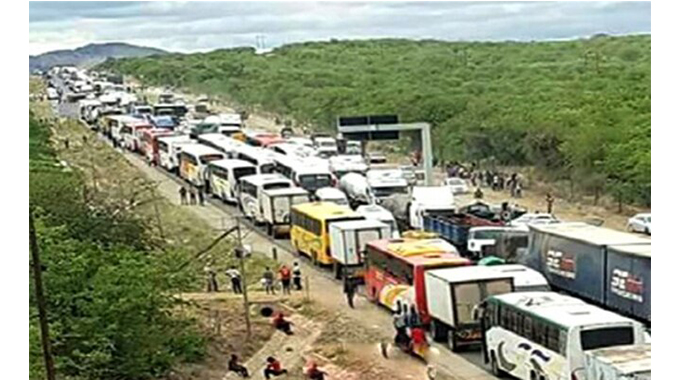COMMENT: Beitbridge traffic jam bad for business

THERE is a gridlock at Beitbridge Border Post stretching for up to eight kilometres.
The staggeringly long queue of heavy trucks starts from the South African side of the border post, running back into Zimbabwe along the Beitbridge-Harare Road. It’s like nothing is happening there, just a parking lot.
As we report elsewhere today, the traffic jam which started early last week, is forcing delivery trucks to wait for a minimum of two days before being cleared to drive into South Africa. The reason for the delay is that South African border officials are struggling with the mandatory Covid-19 screening of truckers intending to enter that country.
The drivers would have been cleared in our country at data processing centres in Harare, Bulawayo and Masvingo thus all crews that arrive at the Zimbabwean side of the border and across the river would have been cleared having undergone Covid-19 screening at the three centres.
On the other side, the screening process is centralised, being done at the border post. The exercise is time-consuming with officers naturally out to satisfy themselves that indeed truckers cleared from this side aren’t Covid-19 positive.
Zimbabwe Revenue Authority Regional Manager, Beitbridge, Mr Innocent Chikuni said all the trucks had been cleared on the Zimbabwe side and were being released across the border in batches.
“We have gone hi-tech and these trucks only travel to the border when documentation is complete. That’s the case, but then the South Africans are saying they have limited space on their commercial side,” he said.
It is clearly understandable that South African border officials need to independently verify the Covid-19 status of everyone who visits their country, including truck drivers. This ensures that only healthy visitors are allowed into a country that is battling Africa’s biggest Covid-19 challenge.
However, it may be useful for them to adopt the screening system that Zimbabwe has adopted and, as Mr Chikuni says, is serving us extremely well thus far. To avoid the gridlock we are seeing and given that crossing points typically lack space to accommodate high numbers of vehicles, they can establish screening points at Musina or other centres further inland.
This, as has been the case with the Zimbabwean system, smoothens the flow of traffic for the benefit of everyone.
Truckers would not have to suffer the fatigue of queuing up for so long.
More importantly the cargo they would be moving gets to its destination most expeditiously. That cargo is business, it must be remembered. In some cases the cargo can be perishable, thus has to be delivered fast.
Beitbridge Border Post is sub-Saharan Africa’s busiest inland port of entry. It links about four countries with the continent’s economic powerhouse. Up to 1 500 trucks pass through it daily. Passenger traffic is seen picking up two weeks after travel restrictions were eased and as the peak travelling season begins this week so the jam must be broken.
In addition to slowing down business, the congestion poses a traffic hazard. A queue of stationary trucks for eight kilometres on the side of a road as busy as the Beitbridge-Harare one is potentially dangerous. Accidents can occur as a result on a highway that already has the record of being the country’s most dangerous.
Home Affairs Minister, Kazembe Kazembe told us yesterday that he will soon contact his South African counterpart Aaron Motsoaledi to find a way around the traffic.
We expect a solution to the bumper-to-bumper situation very soon. There is already a bad situation at Beitbridge and there is a risk that if the congestion is not addressed now, it might worsen in the next few days as more travellers seek to pass through the border post in the run-up to the Christmas season.








Comments